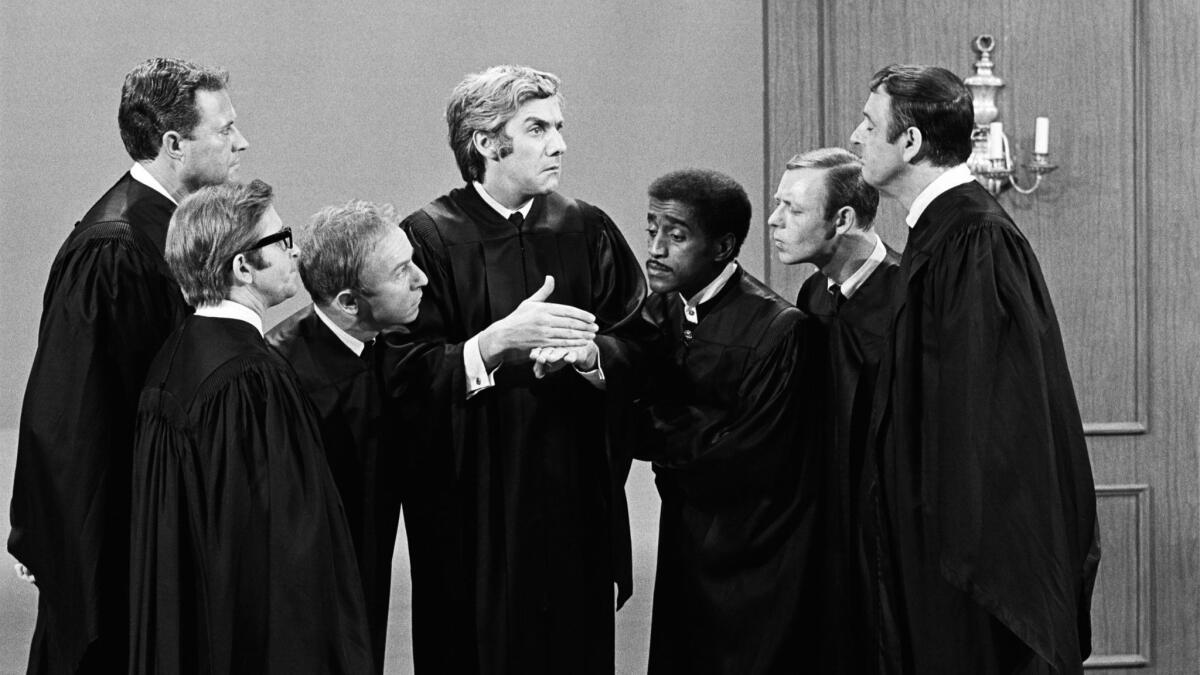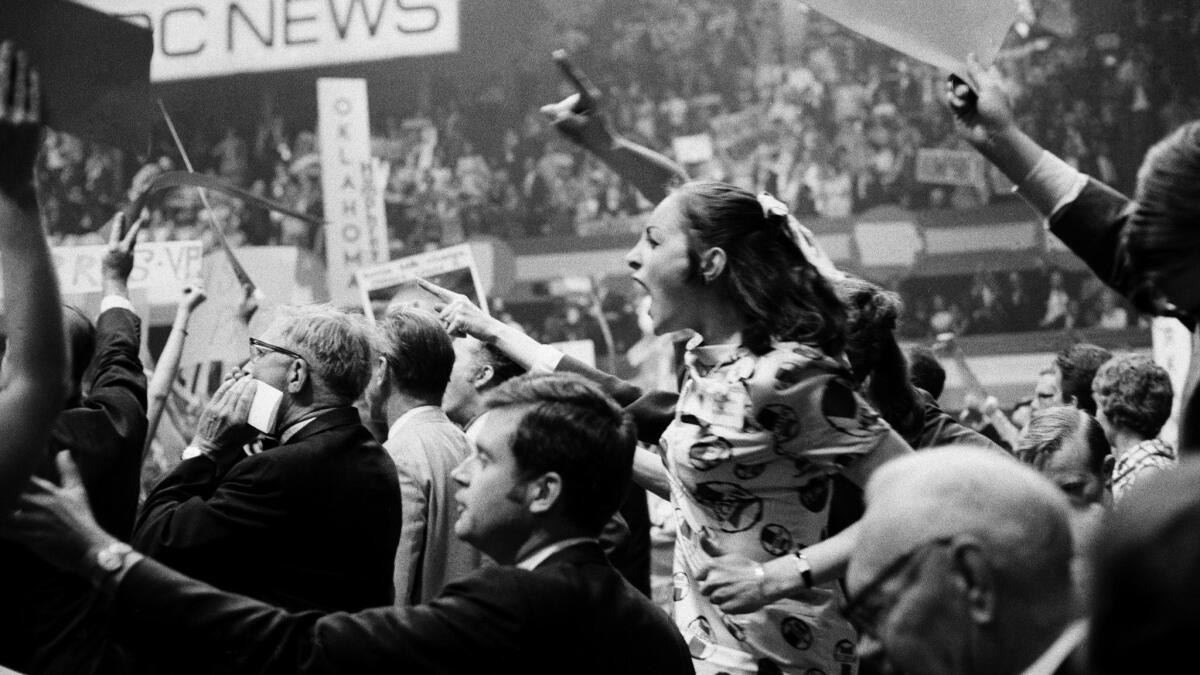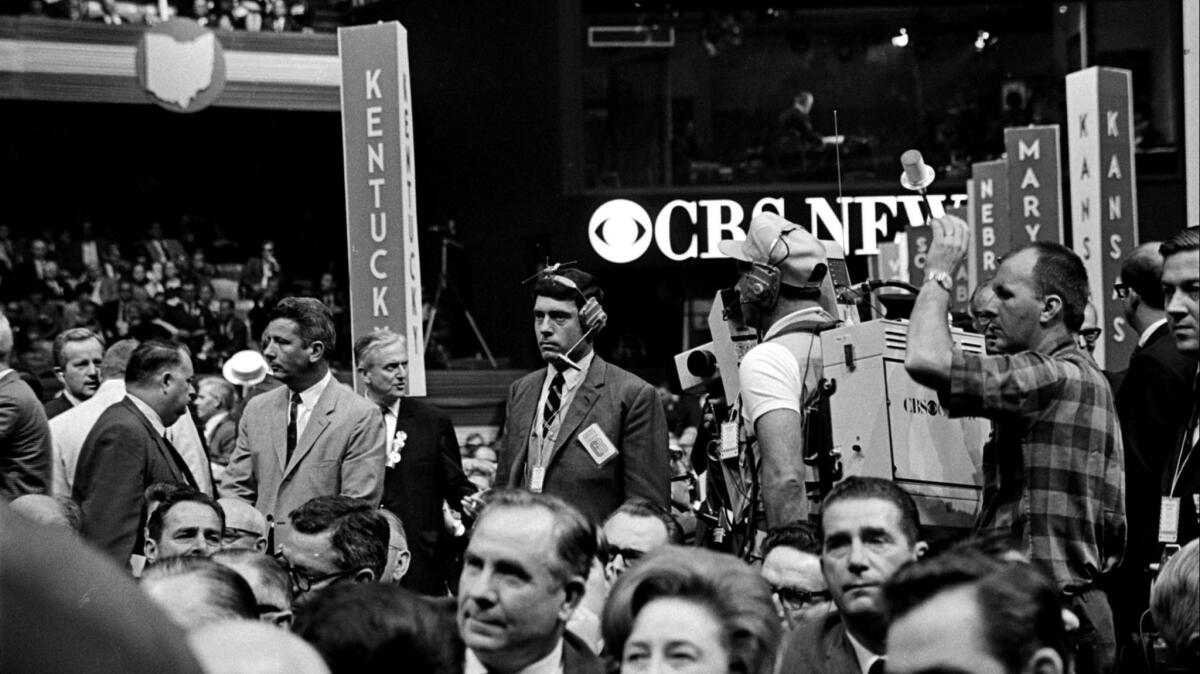Watching ‘The Smothers Brothers,’ ‘Laugh-In’ and the Democratic National Convention
- Share via
The year 1968, as I remember it, had the quality of lasting longer than other years, of being in no hurry to be through with you, like a predator playing with its prey before swallowing it whole. I also watched a lot of television.
There was war in Southeast Asia and a war in the streets of the United States; you could see them any night on the evening news. The Rev. Martin Luther King Jr. was assassinated. Robert F. Kennedy was assassinated. But you would not have known that from prime-time television. The 1967-68 season was full of westerns (a surprising lot of them), quasi-westerns, World War II dramas, cop and lawyer shows, a little espionage, a little sci-fi. Sitcoms were even more removed from the chaos and challenges of contemporary America.
For the record:
8:35 a.m. April 23, 2018This article gives the title of a song Pete Seeger sang on “The Smothers Brothers Comedy Hour” as “Knee Deep in the Big Muddy.” The correct title is “Waist Deep in the Big Muddy.”
READ MORE: A look back at entertainment in 1968 »
It fell to variety, that old vaudevillian, to engage the real world, and to reflect it: Currency, if not necessarily topicality, mattered in variety. Black musicians and comedians and cultural figures first made their way on to television through portals like “The Ed Sullivan Show” and “The Hollywood Palace.” Rock bands brought messages, no less subversive for often being coded, from the counterculture.
Television, as constituted at that time, could of course not be completely countercultural, but two variety shows — “Rowan & Martin’s Laugh-In” and “The Smothers Brothers Comedy Hour” — gave relevance a try. Like Mad magazine, they opened a window onto the absurdities and hypocrisies of the adult world and its institutions. Each in its own way was enlightening.

Rock bands brought messages, no less subversive for often being coded, from the counterculture.
“Rowan & Martin’s Laugh-In” — as in sit-in, be-in, love-in — premiered as a series on NBC in February 1968, after a special in September 1967. Seen from today, it looks a little behind its time, a 1950s person’s version of the 1960s — bikini-clad go-go dancing, hippie jokes, jokes about Raquel Welch’s breasts, even as the dream of the Summer of Love had given way to a year of violence and bad vibes.
Hosts Dan Rowan and Dick Martin, a comedy team for some 15 years by then, both turned 46 the year “Laugh-In” began. They wore tuxedos. Rowan always had a cigarette going; Martin, who portrayed a kind of idiot playboy in their double act, had as a catchphrase, “I’ll drink to that.” Creator George Schlatter had booked acts in Las Vegas and onto the pre-rock Sunset Strip; the players he first assembled for “Laugh-In” were mostly over 30, 22-year-old Goldie Hawn being the notable exception. (She and Lily Tomlin, who joined in 1969, were the show’s only breakout stars.)
But if it was not cutting-edge in a way that anyone actually on a cutting edge would recognize as... cutting edge, within the context of prime-time television its speed, absurdity and cultivated air of anarchy made it feel different and modern. If it was not exactly political, it was certainly topical, and that it even acknowledged Vietnam, social inequity and birth control set it apart from nearly everything else on television.
Sometimes it did cut deeply, as with the show’s Flying Fickle Finger of Fate, awarded for moral failure, for letting the country down; the first was awarded to “the United States Congress… for ignoring the wishes of 200 million Americans and delaying passage of a gun control law.” But “Laugh-In” was also widely popular and won Emmys; its blows against the Empire were acceptable within the cultural mainstream. John Wayne appeared regularly. Richard Nixon, running for president, came on to say, “Sock it to me?”

The Smothers Brothers were more purposeful, more sincerely sincere. When CBS offered them 13 weeks following “Sullivan” in what Dick Smothers later called a “suicide spot” opposite “Bonanza,” older brother Tommy Smothers demanded creative control.
“I wanted to be able to do sketches that had a little more content to it,” he said later. The writing staff had its old pros (Al Gordon and Hal Goldman had written for Jack Benny and Red Skelton), but overwhelmingly featured young, offbeat and sometimes untested talent, including Steve Martin, Bob Einstein, Lorenzo Music, Rob Reiner and Mason Williams.
Though the brothers were hired by CBS in part for their relative youth — Tommy turned 30 around the time the show premiered, and Dick was still in his 20s — nothing could have felt less subversive than the comedy they had previously practiced, with its tales of sibling rivalries and pumas hiding in crevices. With their astronaut haircuts, red blazers and ties and Kingston-Trio-minus-one harmonies, they seemed like messengers from the start of the decade. But the ties were soon replaced by turtlenecks. Mustaches appeared. A battle was raised.

The brothers were clearly on the left. (Dick: “Our government is asking us as citizens to refrain from traveling in foreign lands.” Tom: “OK, all you guys in Vietnam, come on home.”) Early in their second season, they clashed with the network over cutting an antiwar song sung by guest Pete Seeger, “Knee Deep in the Big Muddy.” Such conflicts would occur regularly enough that CBS began demanding to see finished episodes far in advance.
Cast member Pat Paulsen delivered ironic “editorials” on various hot topics, including censorship (“We are allowed to say Ronald Reagan is a lousy actor, but we’re not allowed to say he’s a lousy governor, which is ridiculous — we know he’s a good actor”) and gun control: “If you’re old enough to get arrested you’re old enough to carry a gun…. Let’s preserve our freedom to kill.” A mock documentary on an ongoing mock campaign, “Pat Paulsen for President,” was the subject of a special episode that fall.
The actual presidential race, meanwhile, provided its own sort of unmissable television. At the Democratic National Convention in Chicago that summer, there was violence outside and inside the hall. Walter Cronkite watched from the press box as Dan Rather was punched in the stomach by convention security (“I think we got a bunch of thugs here, Dan, if I may be permitted to say so,” said Cronkite). On NBC, Edwin Newman reported from the floor as Chicago police dragged off antiwar delegates.
“It’s easily the first time that policemen have entered the floor of a convention,” said co-anchor Chet Huntley.
“In the United States,” said David Brinkley.
When the Smothers brothers returned from their summer break, their first show of the fall season included a segment in which guest Harry Belafonte sang “Don’t Stop the Carnival” over images of the convention. The network wouldn’t allow it, leaving the brothers to plug the time with an audience Q&A, which concluded with Tommy’s observation that “we are all aware of what’s going on in the country and the language that is used in the country today and the mores, the morals, the ethics and to not be able to discuss it on the biggest and broadest media, television, I think is a disservice to the country,” adding, “If you don’t like what we say you have the ultimate censorship and that is to turn us off.”
CBS did finally turn off “The Smothers Brothers,” the following year, on the pretext that the shows were not being delivered sufficiently early, a significant enough event for Cronkite to mention it on the evening news. (The Smothers subsequently won a breach of contract suit against the network.) And according to Schlatter, he left “Laugh-In” after the Nixon election, when word came down from NBC brass to leave politics alone, precipitating the show’s slow slide toward irrelevance.
And 1968 did eventually come to an end. You bet your sweet bippy it did.

Follow Robert Lloyd on Twitter @LATimesTVLloyd
More to Read
The complete guide to home viewing
Get Screen Gab for everything about the TV shows and streaming movies everyone’s talking about.
You may occasionally receive promotional content from the Los Angeles Times.







